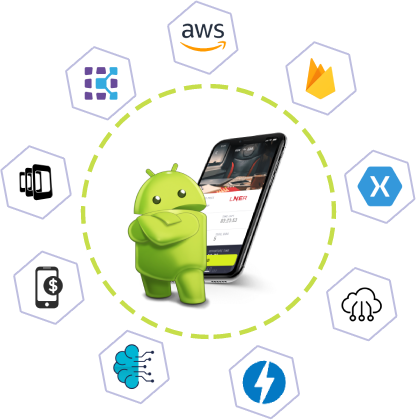In the rapidly evolving landscape of technology, Android app development services have emerged as a critical component for businesses aiming to expand their reach and enhance their digital presence. With over 2.5 billion active users worldwide, Android remains the dominant mobile operating system, offering unparalleled opportunities for developers and businesses alike. This article delves into the essential aspects of Android app development services, highlighting their importance, the development process, and future trends.
Importance of Android App Development Services
- Market Reach: Android’s extensive user base provides a vast audience for businesses. Developing an Android app ensures access to a global market, enhancing brand visibility and customer engagement.
- Customization and Flexibility: Android’s open-source nature allows for extensive customization. Developers can tailor applications to meet specific business needs, ensuring a unique and personalized user experience.
- Cost-Effectiveness: Compared to other platforms, Android app development can be more cost-effective. The availability of a wide range of tools and libraries reduces development time and costs, making it accessible for startups and small businesses.
- Integration Capabilities: Android apps can seamlessly integrate with a variety of devices and platforms, including wearables, smart TVs, and IoT devices. This interoperability opens new avenues for innovative applications and services.
The Development Process
Developing a successful Android application involves several key stages:
- Conceptualization and Planning:
- Requirement Analysis: Understanding the client’s needs and defining the app’s objectives.
- Market Research: Analyzing competitors and identifying unique selling points.
- Feasibility Study: Assessing technical and financial feasibility.
- Design:
- UI/UX Design: Creating user-friendly interfaces and ensuring a seamless user experience.
- Prototyping: Developing prototypes to visualize the app’s functionality and design.
- Development:
- Front-end Development: Writing code for the app’s user interface.
- Back-end Development: Setting up servers, databases, and application logic.
- API Integration: Integrating third-party services and APIs.
- Testing:
- Quality Assurance: Conducting thorough testing to identify and fix bugs.
- User Testing: Gathering feedback from beta users and making necessary adjustments.
- Deployment:
- App Store Submission: Preparing the app for launch on the Google Play Store.
- Marketing and Promotion: Implementing strategies to promote the app and attract users.
- Maintenance and Updates:
- Regular Updates: Ensuring the app remains compatible with the latest OS versions and devices.
- User Support: Providing ongoing support to address user issues and feedback.
Future Trends in Android App Development
The field of Android app development is continuously evolving, driven by technological advancements and changing user preferences. Here are some trends shaping the future of Android app development:
- Artificial Intelligence and Machine Learning: Incorporating AI and ML to enhance app functionalities, such as personalized recommendations, chatbots, and advanced data analytics.
- Internet of Things (IoT): Developing apps that can interact with IoT devices, enabling smarter homes, healthcare solutions, and industrial applications.
- Augmented Reality (AR) and Virtual Reality (VR): Creating immersive experiences for gaming, education, and retail through AR and VR technologies.
- Blockchain Technology: Integrating blockchain for enhanced security, transparency, and decentralized applications.
- 5G Technology: Leveraging 5G’s high-speed connectivity to develop apps with superior performance and real-time capabilities.
- Cross-Platform Development: Utilizing frameworks like Flutter and React Native to build apps that run seamlessly on both Android and iOS platforms, reducing development time and costs.
Conclusion
Android app development services play a pivotal role in today’s digital ecosystem, offering businesses the tools and platforms to innovate and thrive. By understanding the development process and staying abreast of emerging trends, businesses can leverage Android’s vast potential to create impactful and user-centric applications. Whether it’s through enhancing customer engagement, streamlining operations, or exploring new business models, Android app development is a key driver of digital transformation.
In the rapidly evolving landscape of technology, Android app development services have emerged as a critical component for businesses aiming to expand their reach and enhance their digital presence. With over 2.5 billion active users worldwide, Android remains the dominant mobile operating system, offering unparalleled opportunities for developers and businesses alike. This article delves into the essential aspects of Android app development services, highlighting their importance, the development process, and future trends.
Importance of Android App Development Services
- Market Reach: Android’s extensive user base provides a vast audience for businesses. Developing an Android app ensures access to a global market, enhancing brand visibility and customer engagement.
- Customization and Flexibility: Android’s open-source nature allows for extensive customization. Developers can tailor applications to meet specific business needs, ensuring a unique and personalized user experience.
- Cost-Effectiveness: Compared to other platforms, Android app development can be more cost-effective. The availability of a wide range of tools and libraries reduces development time and costs, making it accessible for startups and small businesses.
- Integration Capabilities: Android apps can seamlessly integrate with a variety of devices and platforms, including wearables, smart TVs, and IoT devices. This interoperability opens new avenues for innovative applications and services.
The Development Process
Developing a successful Android application involves several key stages:
- Conceptualization and Planning:
- Requirement Analysis: Understanding the client’s needs and defining the app’s objectives.
- Market Research: Analyzing competitors and identifying unique selling points.
- Feasibility Study: Assessing technical and financial feasibility.
- Design:
- UI/UX Design: Creating user-friendly interfaces and ensuring a seamless user experience.
- Prototyping: Developing prototypes to visualize the app’s functionality and design.
- Development:
- Front-end Development: Writing code for the app’s user interface.
- Back-end Development: Setting up servers, databases, and application logic.
- API Integration: Integrating third-party services and APIs.
- Testing:
- Quality Assurance: Conducting thorough testing to identify and fix bugs.
- User Testing: Gathering feedback from beta users and making necessary adjustments.
- Deployment:
- App Store Submission: Preparing the app for launch on the Google Play Store.
- Marketing and Promotion: Implementing strategies to promote the app and attract users.
- Maintenance and Updates:
- Regular Updates: Ensuring the app remains compatible with the latest OS versions and devices.
- User Support: Providing ongoing support to address user issues and feedback.
Future Trends in Android App Development
The field of Android app development is continuously evolving, driven by technological advancements and changing user preferences. Here are some trends shaping the future of Android app development:
- Artificial Intelligence and Machine Learning: Incorporating AI and ML to enhance app functionalities, such as personalized recommendations, chatbots, and advanced data analytics.
- Internet of Things (IoT): Developing apps that can interact with IoT devices, enabling smarter homes, healthcare solutions, and industrial applications.
- Augmented Reality (AR) and Virtual Reality (VR): Creating immersive experiences for gaming, education, and retail through AR and VR technologies.
- Blockchain Technology: Integrating blockchain for enhanced security, transparency, and decentralized applications.
- 5G Technology: Leveraging 5G’s high-speed connectivity to develop apps with superior performance and real-time capabilities.
- Cross-Platform Development: Utilizing frameworks like Flutter and React Native to build apps that run seamlessly on both Android and iOS platforms, reducing development time and costs.
Conclusion
Android app development services play a pivotal role in today’s digital ecosystem, offering businesses the tools and platforms to innovate and thrive. By understanding the development process and staying abreast of emerging trends, businesses can leverage Android’s vast potential to create impactful and user-centric applications. Whether it’s through enhancing customer engagement, streamlining operations, or exploring new business models, Android app development is a key driver of digital transformation.



